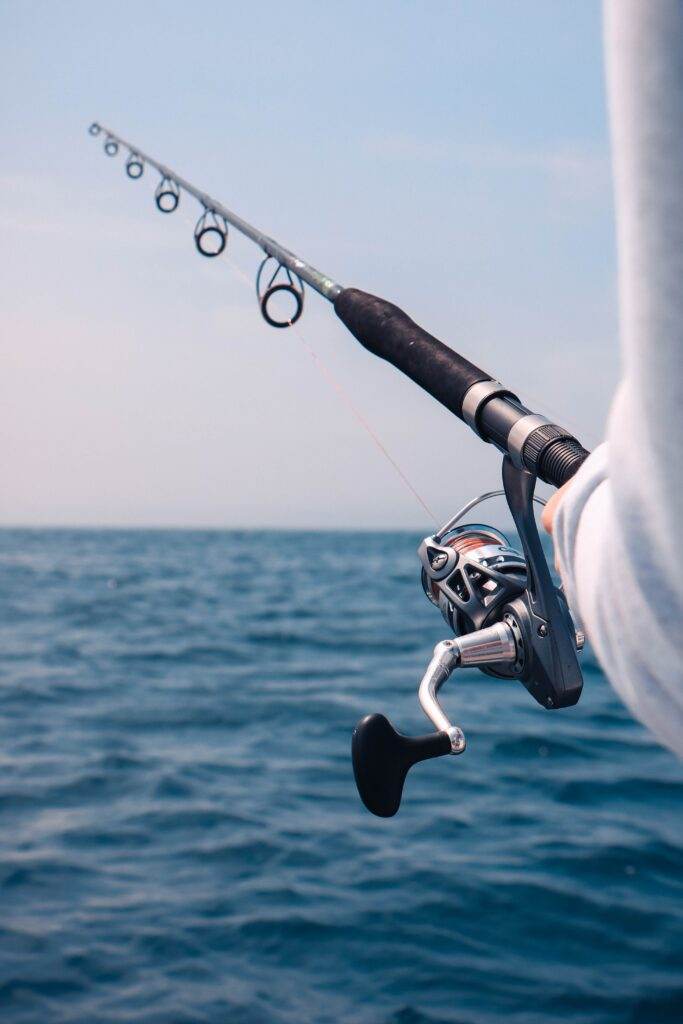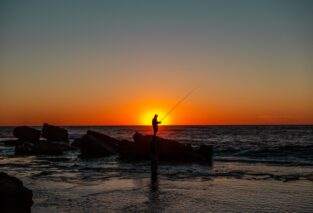Have you ever wondered if it’s possible to go fishing in windy weather? The answer is yes! With the right tips and techniques, you can still enjoy a successful fishing trip even on blustery days. In this article, we will explore some helpful strategies that will enable you to navigate windy conditions like a pro. Whether you’re a seasoned angler or just starting out, these tips will ensure that the wind doesn’t dampen your fishing spirit. So grab your fishing gear and get ready to make the most out of those gusty days on the water!

Understanding the Impact of Wind on Fishing
Fishing in windy conditions can present unique challenges for anglers. Wind has a significant impact on water, fish behavior, and fishing techniques. By understanding how wind influences these factors, you can learn to adapt and optimize your fishing experience.
The Effects of Wind on Water
One of the most noticeable effects of wind on water is the creation of waves and ripples. The strength and direction of the wind determine the size and intensity of these water movements. In calm conditions, fish tend to be more relaxed and stay close to the surface. However, as the wind picks up, it creates current and stirs up the water, forcing fish to adjust their behavior.
How Wind Influences Fish Behavior
Wind affects fish behavior in several ways. Firstly, it oxygenates the water by causing waves and mixing the water layers. This increase in oxygen levels can stimulate fish activity and make them more receptive to feeding. Secondly, wind can change water temperature and turbidity. Fish may seek sheltered areas or adapt their feeding patterns accordingly. Lastly, wind can disturb the natural food chain, causing baitfish and other prey to move, which in turn attracts larger predatory fish.
Assessing Wind Conditions
To optimize your fishing experience, it is crucial to assess the wind conditions before heading out. Here are two key factors to consider:
Monitoring Weather Forecasts
Before planning your fishing trip, check the weather forecast for wind speed and direction. Websites, apps, and local news stations often provide this information. Understanding the forecast will help you determine the best time and location for your outing. Pay attention to any weather warnings or advisories that may affect safety on the water.
Determining Wind Speed and Direction
Once you are on the fishing spot, it is essential to assess the wind speed and direction. If possible, carry a portable anemometer, a device that measures wind speed. Alternatively, you can observe the movement of leaves, flags, or even cloud patterns to gauge the wind direction. Understanding wind speed and direction will allow you to make informed decisions on where to fish and which techniques to employ.

Choosing the Right Fishing Spot
With wind conditions assessed, now it’s time to select an optimal fishing spot. Take into consideration the following factors:
Sheltered Areas and Wind Breaks
When faced with windy conditions, look for sheltered areas or wind breaks where the wind’s impact will be lessened. These can include coves, inlets, or areas behind islands or large structures. These spots provide natural protection from strong winds and create calmer waters where fish may seek refuge.
Considering Water Turbidity and Temperature
Wind can significantly impact water turbidity and temperature. Strong winds can stir up sediment, making the water murky and reducing visibility. In these situations, consider targeting fish species that rely less on sight and more on other senses, such as smell or sound. Additionally, wind can cause upwelling, where cooler water rises to the surface. This can attract fish seeking cooler temperatures and more oxygen-rich waters.
Adapting Your Fishing Techniques
To maximize your success in windy conditions, it is essential to adapt your fishing techniques. Here are two key adjustments to consider:
Adjusting Casting Techniques
In windy conditions, casting can become more challenging. Adjust your casting technique by aiming lower and using shorter, more controlled casts. This will reduce the impact of wind on your line and increase accuracy. Focus on casting into areas protected from the wind, such as the lee side of structures or areas behind vegetation.
Using Weighted Lines and Lure Selection
To combat the effects of wind, consider using heavier lines and lures. Heavier lines are less likely to be affected by wind drag and enable better control over your presentation. Additionally, opt for lures that are designed to cut through the wind, such as streamlined spoons, heavy jigs, or sinking plugs. These lures will help you maintain better control and accuracy even in windy conditions.

Selecting the Appropriate Fishing Gear
Choosing the right fishing gear is crucial when fishing in windy conditions. Focus on the following aspects:
Choosing the Right Fishing Rod
When faced with strong winds, it is advisable to use a fishing rod with a stiffer backbone. A stiffer rod will provide more control and allow you to handle larger fish more effectively. Additionally, consider using a shorter rod to minimize wind resistance and increase casting accuracy.
Optimal Reel Selection
In windy conditions, a reel with a high gear ratio is recommended. A high gear ratio reel allows you to retrieve and adjust your line quickly, reducing the time spent fighting the wind’s influence. Additionally, select a reel with a good drag system to handle any sudden bursts of speed from fish in challenging conditions.
Tips for Safe Fishing in Windy Conditions
When fishing in windy conditions, it is essential to prioritize safety. Consider the following tips to ensure a safe fishing experience:
Wearing Appropriate Clothing
Dress in layers and wear clothing that provides protection against wind chill. A wind-resistant outer layer, such as a waterproof jacket, can help keep you warm and dry. Additionally, wearing a hat or cap with a chin strap can prevent it from being blown away by strong gusts. Don’t forget to wear sunglasses to protect your eyes from wind-blown debris and the sun’s rays.
Ensuring Boat and Equipment Safety
If fishing from a boat, ensure that it is properly secured and equipped for windy conditions. Double-check that all essential equipment, such as life jackets, anchors, and navigation lights, are in good working order. Pay close attention to the weight distribution in your boat to maintain stability and prevent capsizing. Always carry a whistle or a signaling device to alert others in case of an emergency.

Techniques to Deal with Gusts and Strong Winds
Even with careful planning, fishing in windy conditions can still pose challenges. Here are two techniques that can help you navigate gusts and strong winds:
Anchoring Techniques
Using an anchor can provide stability and keep your boat in a desired fishing spot. Depending on the wind direction, adjust your anchor placement to position your boat in a way that minimizes drift. Anchoring can help you maintain control and focus on fishing rather than constantly battling against the wind.
Drift Fishing Strategies
In some cases, it may be more efficient to embrace the wind and use drift fishing techniques. Drift fishing involves allowing the wind to push your boat naturally along with the current. By adjusting your position and drift speed, you can effectively cover more water and increase your chances of finding feeding fish.
Effective Bait Presentation
Presenting your bait properly is crucial, especially in windy conditions. Consider the following techniques:
Using Bobbers and Floats
Using a bobber or float can make it easier to detect bites and keep your bait at a desired depth. Adjust the bobber or float’s weight to counteract the wind’s effect, ensuring that your bait stays in the strike zone. Additionally, bright, highly visible bobbers or floats are recommended for increased visibility in choppy waters.
Slowing Down the Presentation
In windy conditions, fish may be less active and slower in their response to bait. Adjust your presentation by slowing down your retrieve or reducing the speed of your trolling. This allows fish more time to assess and strike at your bait, increasing your chances of a successful catch.

Considerations for Fly Fishing
Fly fishing in windy conditions requires additional skills and considerations. Take note of the following:
Choosing the Right Flies
In windy conditions, consider using heavier flies that will cut through the wind and maintain better control. Nymphs, streamers, or weighted flies are recommended choices. Additionally, opt for flies with a slim design and minimal wind resistance.
Mastering Line Control
Wind can significantly impact your ability to control your fly line. Focus on mastering line control techniques such as mending, reach casting, and roll casting. These techniques will help you navigate gusts and maintain accurate presentations. Experiment with line management and adjust your casting angles to minimize the wind’s effect on your line.
Seeking Professional Guidance
If you’re new to fishing in windy conditions or simply want to enhance your skills, seeking guidance from professionals can be invaluable. Consider the following options:
Joining a Fishing Charter
Booking a fishing charter can provide you with expert guidance and access to prime fishing spots. Experienced captains and guides have a wealth of knowledge regarding fishing in various weather conditions, including wind. They can offer valuable insights, techniques, and strategies specific to the windy conditions you may encounter.
Consulting Local Anglers or Fishing Guides
Engaging with local anglers or fishing guides can provide you with firsthand knowledge of the fishing spots in your area. They can offer advice on specific techniques, tackle selection, and fish behavior in windy conditions. Local knowledge is often invaluable in ensuring a successful and enjoyable fishing trip.
By understanding the impact of wind on fishing, assessing wind conditions, choosing the right fishing spot, adapting your techniques and gear, prioritizing safety, and seeking guidance when needed, you can make the most of your fishing experience even in windy conditions. Armed with these tips and techniques, head out and embrace the challenge of fishing in the wind, knowing that you are well-prepared for success.





